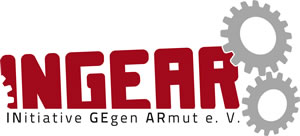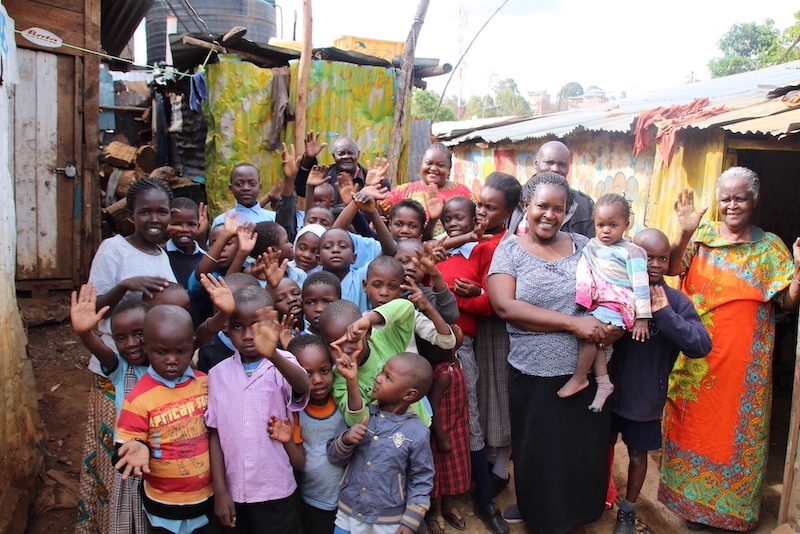
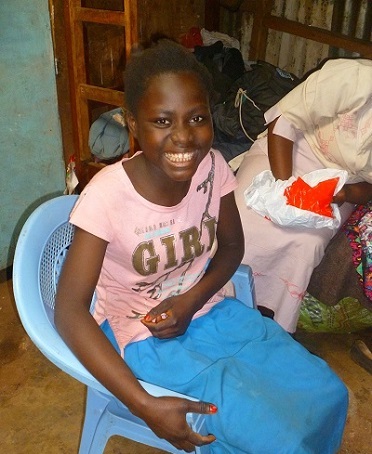 Namasaba was about 13 or 14 years old when she came to live in the Center. She’s not sure about her age, because her mother died during giving birth to her. Her father was murdered during the political upheavals in Kenya in 2008. From then on she lived at the house of her father’s second wife, and for her she was nothing but a maid. Because she wasn’t allowed to go to school, she could neither read nor write and spoke no English. Her stepmother is a prostitute and a drinker. But that ain’t all yet. Namasaba was forced into prostitution as well. When, for the first time, her stepmother brought home two men, who paid for raping Namasaba, she was eleven years old.
Namasaba was about 13 or 14 years old when she came to live in the Center. She’s not sure about her age, because her mother died during giving birth to her. Her father was murdered during the political upheavals in Kenya in 2008. From then on she lived at the house of her father’s second wife, and for her she was nothing but a maid. Because she wasn’t allowed to go to school, she could neither read nor write and spoke no English. Her stepmother is a prostitute and a drinker. But that ain’t all yet. Namasaba was forced into prostitution as well. When, for the first time, her stepmother brought home two men, who paid for raping Namasaba, she was eleven years old.
From then on the little girl was abused on a regular basis, leaving her scarred bodily as well as mentally. She wasn’t able to go to the toilet without pains and even walking hurt her. A girl who lived in the Center knew Namasaba and told her story to the two caregivers. From then on they tried everything they could to get Namasaba away from her stepmother and to bring her into the Center.
Since she is living in the Fruitful Talent Center, she can finally be a child and spend her time with peers. She learns how to read and write and her English is constantly improving. For a long time Namasaba was quite shy and almost didn’t talk at all. But in the meantime she shows her great smile more and more.
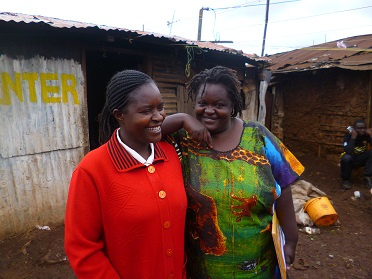 The Fruitful Talent Center was already established in the mid-1980’s. Together with a group of single-mothers, Rona Modanyi founded a small school to make possible free education for her own and other poor children. Many of those children visiting that school regularly have been orphans for whom the Fruitful Talent Center became their new home. So an orphanage was built next to the school in which the children found a new home.
The Fruitful Talent Center was already established in the mid-1980’s. Together with a group of single-mothers, Rona Modanyi founded a small school to make possible free education for her own and other poor children. Many of those children visiting that school regularly have been orphans for whom the Fruitful Talent Center became their new home. So an orphanage was built next to the school in which the children found a new home.
Rona, who is called “Sho-Sho” (which in English means mother of all) by everyone, is still heading the Fruitful today and treats every child as if it was her own.
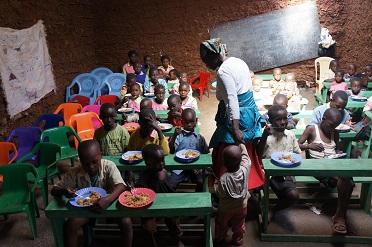
Many children in Kenya lose their parents to diseases such as AIDS or hepatitis. Especially in the slum areas the rate is very high. The Fruitful Talent Center tries to give these children a new home.
The center really becoming a home is shown by the caretakers, some of whom grew up there themselves, now taking care of the children and thus becoming a family.
In addition to the home, a small elementary school and a kindergarten belong to the center.
Attendance at elementary school is free of charge in Kenya. Nevertheless, many cannot afford to attend because the cost of school uniforms, books and exams is too high. For this reason, many children from the neighborhood come to the center every day. Here they can play with their peers and learn together. At lunchtime, a hot meal is provided for everyone - for some, this the only food they have for the day.
The center also offers opportunities for meaningful leisure activities. In the afternoons and on weekends, they dance and do gymnastics together. The older children pass on their knowledge and skills to the younger ones. This has already resulted in acrobatic groups that perform at events throughout Nairobi.
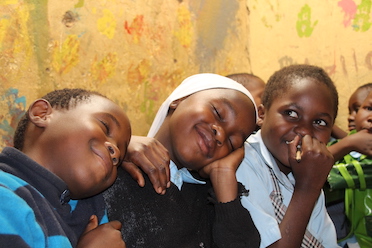 The home takes in orphans, half-orphans or abused children who can no longer find shelter with relatives.
The home takes in orphans, half-orphans or abused children who can no longer find shelter with relatives.
Initially, they can attend their own school, after which they are given access to a more advanced school, such as high school.
In consultation with INGEAR, the number of children admitted is adapted to the situation. The school is also attended by children from the neighborhood who do not live in the center, if their parents cannot afford a state school.
 The biggest problem is arguably the center's policy of helping anyone who needs help. The unfavorable local conditions and the financial situation often make this difficult.
The biggest problem is arguably the center's policy of helping anyone who needs help. The unfavorable local conditions and the financial situation often make this difficult.
The center is located in the Kibera slums, which are not developed and where space is a rare commodity. The buildings are very small and dilapidated. Although a lot of renovation work has been carried out in recent years, the measures are not enough. The hygienic conditions are difficult. There are only two pit toilets available, and cooking is done on an open fire. The school now has at least its own water tank; However, there is no running water or electricity. The school only consists of one room - divided into different areas by partition walls - in which all students study together. The beds are not enough, so that some children have to share their sleeping space. Due to the location in the middle of the slum, expansion is hardly possible.
Although the center is registered as an official institution, there is little hope of financial support from the Kenyan government. It is therefore dependent on private donations, mostly from abroad.
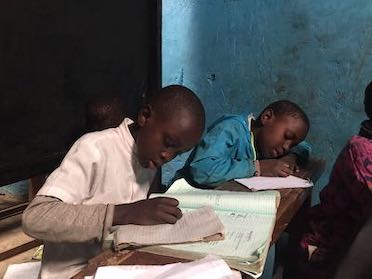 The primary goal is to guarantee the long-term basic supply for everyone. In addition to accommodation, care and a balanced diet, this also includes education. The aim is to enable everyone to graduate from school so that the children can later face and finance their own lives. In addition, everyone should have access to medical care.
The primary goal is to guarantee the long-term basic supply for everyone. In addition to accommodation, care and a balanced diet, this also includes education. The aim is to enable everyone to graduate from school so that the children can later face and finance their own lives. In addition, everyone should have access to medical care.
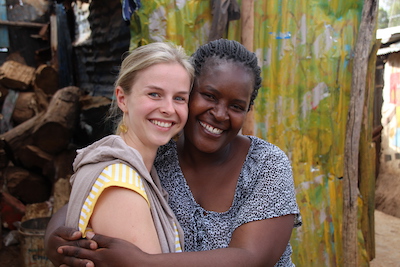 INGEAR and the Fruitful Talent Center have been working together for several years. Along with a few other small donors, INGEAR is the main sponsor.
INGEAR and the Fruitful Talent Center have been working together for several years. Along with a few other small donors, INGEAR is the main sponsor.
Since the beginning of the collaboration, INGEAR has financed the cost of daily meals for the school children and staff. Furthermore, the school costs of the older orphans, who attend high school, are covered.
All employees are paid a monthly salary and are provided with health insurance by INGEAR.
In the course of the cooperation, the idea of a health fund was born, since most of the residents are not insured. This can be used to pay for doctor's visits and necessary medication. In consultation with the project supervisors, regular renovation work and necessary purchases are paid for.
The project supervisors of INGEAR have all been on site and know the home and the conditions. They are in regular contact with the center's staff. In addition to financial security, work is constantly being done to improve the internal structures and organisation of the home. Since the beginning of the cooperation, some challenges could be improved sustainably.
